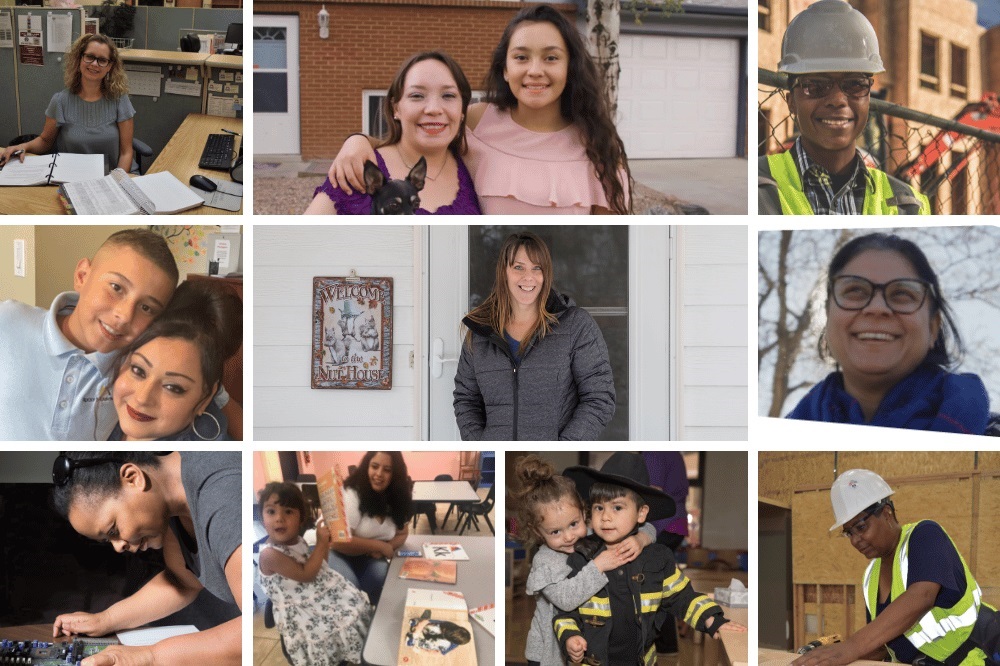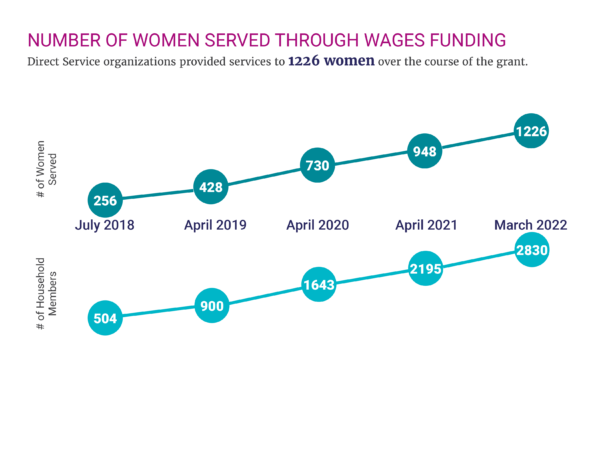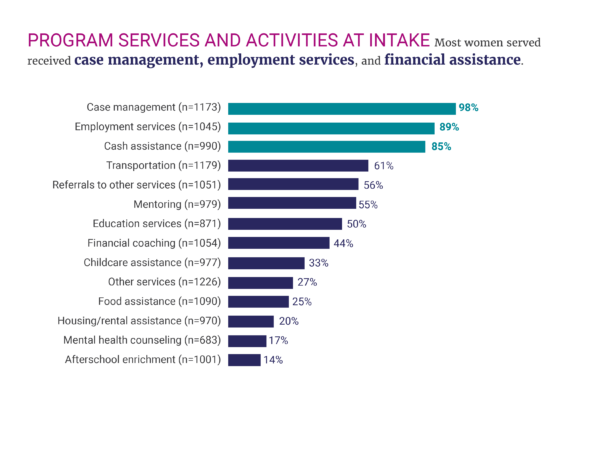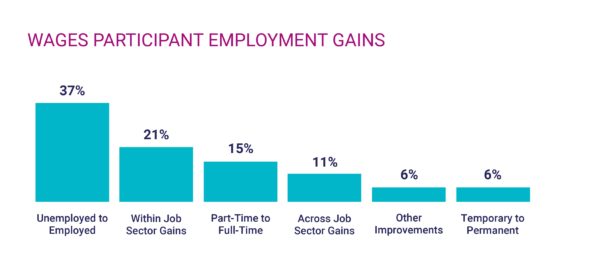
Four Years of WAGES Grantmaking
What We Achieved and Learned Through WAGES Grantmaking
Too many Colorado women live in or on the economic edge or work in low-wage jobs with little opportunity for advancement. From 2017-2021, WFCO executed WAGES (Women Achieving Greater Economic Security) – our grantmaking program – to advance and accelerate economic opportunities for Colorado women and their families.
WFCO funded a cohort of 15 direct service across the state and eight policy advocacy organizations to implement services and strategies that were designed to propel women into careers that would enable them to meet their needs and the needs of their families, with a special focus on equity and two-generational approaches.
Who Were the Women Served by WAGES?
 Overall, WAGES direct-service providers served 1,226 diverse participants. When considering that family members also benefit from women improving their economic security and well-being, an estimated 4,056 individuals were reached in total.
Overall, WAGES direct-service providers served 1,226 diverse participants. When considering that family members also benefit from women improving their economic security and well-being, an estimated 4,056 individuals were reached in total.
Most participants served through WAGES were single parents (65%) with one or two children (70%). They lived across Colorado, with about 38% living outside of the Denver Metro area. WAGES participants were more racially/ethnically diverse than the Colorado population: the majority identified as Latinx/Hispanic (46%), followed by participants who identified as white (24%) or Black or African American (22%).
Direct-service grantees were asked to report on the number of participants who experienced specific barriers to obtaining a livable wage. The top four barriers at program entry were access to affordable housing, access to affordable child care, transportation, and limited employment history.
Direct-service strategies for economic security
 To address the diverse needs/barriers to achieving economic security, grantee organizations implemented a variety of services and approaches. Most of their participants received case management, financial assistance, and employment services, thus ensuring a whole-person and individualized approach. Throughout the years, grantees surfaced the importance of providing cash assistance to support participants on their path to economic security. Financial and basic needs assistance were identified as a particularly important support during COVID-19.
To address the diverse needs/barriers to achieving economic security, grantee organizations implemented a variety of services and approaches. Most of their participants received case management, financial assistance, and employment services, thus ensuring a whole-person and individualized approach. Throughout the years, grantees surfaced the importance of providing cash assistance to support participants on their path to economic security. Financial and basic needs assistance were identified as a particularly important support during COVID-19.
“We saw that many women were able to improve their self-sufficiency with just a small amount of financial support indicating that relatively small barriers can keep women stuck for a long time,” said one grantee.
A majority of participants made education and employment gains
Although the COVID-19 pandemic created challenges for WAGES participants, many were still able to achieve success while learning new skills to keep their families afloat. Over the four years of the grant:
 346 participants made employment gains, 37% of whom were unemployed and attained employment, 21% of whom experienced within sector gains (e.g., a promotion), and 15% of whom went from part-time to full-time employment. Participants were employed in fields such as health care, human services, information technology (IT), construction, and financial services.
346 participants made employment gains, 37% of whom were unemployed and attained employment, 21% of whom experienced within sector gains (e.g., a promotion), and 15% of whom went from part-time to full-time employment. Participants were employed in fields such as health care, human services, information technology (IT), construction, and financial services.
442 participants reached educational goals, 26% of whom obtained a high school diploma or GED, 17% of whom received a professional certification, and 10% of whom obtained a college degree. Grantees noted that many participants put educational goals on hold while they addressed immediate needs created by COVID-19.
Changing lives by changing systems
Over four years, WAGES policy advocacy grantees employed a multi-faceted approach to increasing economic security for women and their families. The different strategies that grantees employed included formal coalitions, community and volunteer engagement, research and policy development, information dissemination to the public, strengthening informal networks, and influencing policy and decision makers.
WAGES grantees led efforts to address the systemic and intersecting inequities that prevent women and communities from advancing economically and building assets and wealth across generations. The most significant policy wins supported by WFCO and grantees from 2017-2021 included:
- Equal Pay for Equal Work Act
- Paid Family and Medical Leave Insurance Program (FAMLI)
- Tax Fairness for Coloradans package
- State funding for universal full-day kindergarten and universal preschool
- Supports for Early Childhood Educator Workforce
- The Child Tax Credit (CTC) was expanded to make it available to all Coloradans, including those who do not have a social security number
- Child Care Expenses Tax Credit for Low-Income Families (HB19-1013) expanded the income tax credit for child care expenses for residents with a federally adjusted gross income of $25,000 or less.
Direct-service and policy advocacy grantee partnerships essential to WAGES success
The partnership between policy advocacy grantees and direct-service grantees was critical to the success of WAGES. The cohort learning model or learning community among grantees allowed for grantees to innovate on strategies, foster new conversations and collaborations, and inform the larger field of stakeholders interested in improving economic opportunities for women and their families. A policy grantee discussed the benefit of working with direct-service grantees who work with families that qualify to receive the Earned Income Tax Credit.
“We were able to work with women and families and talk to them about what the benefits of expanding the EITC and CTC would mean for them. With this partnership, they were able to share their stories, on videos, social media posts…and other earned media, as well as testify for these measures at the legislature. These voices helped lift up these important tax policies and reinforce the need to create a system that lifts up our Colorado families.”
Applying WAGES grantmaking learnings to programs in 2021 and beyond
In 2021, WFCO launched the next iteration of WAGES, called WINcome (Women + Income = Women Thriving). WINcome continues to invest in partnerships with both direct services and policy advocacy grantees. Further, to demonstrate that individuals can advance economically when they are trusted to make their own decisions about what they and their families need, WINcome grants will support Colorado women who participate in programs offered by grantee partners with direct
cash assistance to supplement, not replace, their income and other benefits they may receive through public and nonprofit programs. WINcome grants also advance systemic changes that support gender, racial, & economic equity for Colorado women and families.
Read the complete WAGES four-year report.
OMNI Institute served as the learning and evaluation partner of the initiative.

